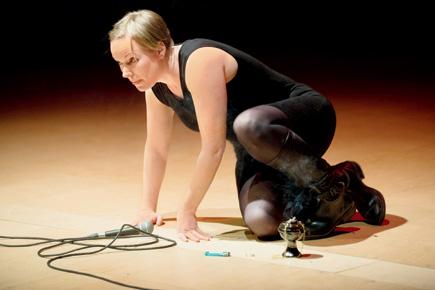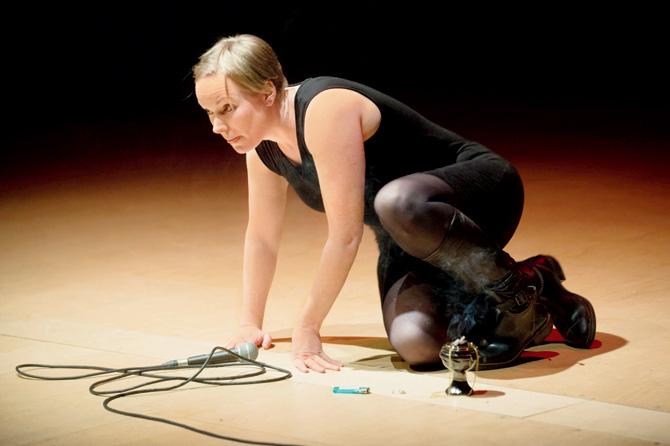A ripped up copy of EL James' erotica becomes an allegory for the female body in a new play that uses sign language

Hannah Silva
ADVERTISEMENT
Hannah Silva, known for experimental performances, brings her much acclaimed 2014 solo act, Schlock! to Prithvi today, on the fourth and last day of the Tata Literature Live! 2015. Schlock is an American slang term for inferior goods —erotica, true-life stories in magazines or DVD slasher films.
The play splices together two books, EL James’ Fifty Shades of Grey and punk poet Kathy Acker’s In Memoriam to Identity. Silva’s solo performance incorporates multiple techniques of storytelling — from reading extracts of Fifty Shades of Grey, to describing it in sign language; from vocal soundscapes made using articulation techniques and a loop pedal, to a strange narrative of a mother and her child. All these come together to create a piece that subverts the language of Fifty Shades of Grey in order to tell the story of a woman diagnosed with breast cancer.

“Reading Fifty Shades of Grey shocked me — not the sex scenes or the bad writing, but the fact that the young female protagonist doesn’t want the kind of relationship she is being coerced into. It is a story about control, power and manipulation; it’s also a damaging and inaccurate portrayal of BDSM relationships. I wanted to dig deeper into the feelings of loss and sadness I felt when reading it,” says Silva adding, “I wouldn’t say the piece is a critique of Fifty Shades…, it just mines the language and exposes some of the violence behind it.”
However, the poet-playwright-performer starts her performance with Acker instead of Fifty Shades. “I had read about Acker’s life and struggle with cancer which began to pervade my writing. Just as she would combine scraps of autobiography into her narratives, I was weaving her biography into the work. I needed to write about the body, femaleness, sex, abuse, pain and death. Fifty Shades… is the kind of text Acker might have worked with.”
Elaborating on splicing two different genres of books she says, “I began to note down lines that jumped out at me from both source texts, and played with them, changed words. While writing the play, narratives and images emerged that can’t be found in either source text. Some sections do not use any language from the parent texts. Many sections are heavily cut and rearranged.” For example, she has replaced the words ‘submissive’ with ‘mother’ and ‘dominant’ with ‘child’ and thus the a sentence from Fifty Shades, ‘Am I submissive? Maybe I come across that way. Maybe I misled him in the interview’ becomes: ‘Am I a mother? Maybe I come across that way. Maybe I misled him’.
Silva uses British Sign Language in the performance to explore ways of writing as she wanted to reach out to the speech and hearing impaired audiences. “I love the way gestures are made meaningful. I found that I had to change the way I think about writing and poetry in order to ‘write’ the sign language sections.” But, incorporating sign language in the performance was no easy task. “It took some time for me to find the right person to collaborate with. Eventually I met a hearing disabled actor Daryl Jackson, and working with him was brilliant, he helped me to step into the scenes and become the characters I was writing about,” she adds before signing off.
 Subscribe today by clicking the link and stay updated with the latest news!" Click here!
Subscribe today by clicking the link and stay updated with the latest news!" Click here!












